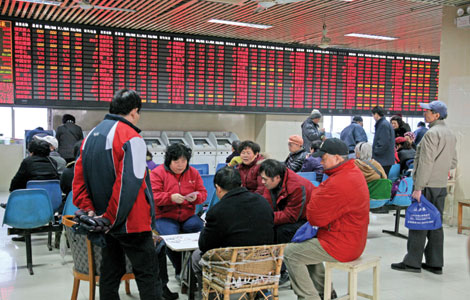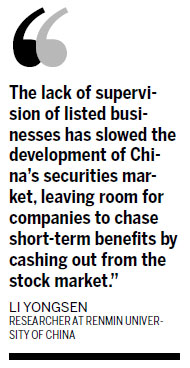CSRC looks to reduce 'irrational' speculation
|
 Investors who buy shares on the first day of trading, eager for short-term returns, help fuel speculative investments and disrupt share prices. Roughly 94.7 percent of new-share speculators made a loss, a statement by the China Securities Regulatory Commission said on Thursday. [A Kai / for China Daily] |

Regulator says weak governance to blame for shareholder losses
BEIJING - China's top securities regulator is seeking methods to curb irrational speculation. The measures may include improving the delisting mechanism and a more efficient risk-warning system for private investors.
The main reason most private shareholders suffered serious losses over the past two years was immature governance of the capital market and a weak regulatory system, according to the China Securities Regulatory Commission in a statement released on Thursday.
"The regulatory agency is formulating policies to curb speculative investments, especially for IPOs and inferior stocks that drive share prices to irrational highs," the statement said.
Official regulations on public companies have not yet been released, although a draft of the rules was released by the CSRC in September 2007.
"The lack of supervision of listed businesses has slowed the development of China's securities market, leaving room for companies to chase short-term benefits by cashing out from the stock market," said Li Yongsen, a researcher with the Financial and Securities Institute at Beijing's Renmin University of China.
Some companies even "embellished" their financial reports to attract more investors, according to Li.
The CSRC plans to establish an independent agency to evaluate the operating systems of public companies, assess investor risks and protect their interests.
Many investors blindly chase high prices for newly listed and low-quality stocks without gathering crucial financial information about the companies involved, which can lead to major losses.
According to data from Shanghai Stock Exchange, in the first two months after debut, the average decline in new shares increased from 6.51 percent in 2010 to 10.56 percent in 2011.
Investors who buy shares on the first day of trading, eager for short-term returns, help fuel speculative investments and disrupt share prices. Roughly 94.7 percent of new-share speculators made a loss, the CSRC statement said.
The Shanghai Composite Index, the main tracker of shares of bigger companies on the Chinese mainland, rose 5.97 points, or 0.3 percent, on Thursday, closing at 2409.55, the highest in more than two months.
However, stock prices have risen at a slower-than-expected pace after the central bank eased monetary policy on Saturday.
"Investors may be waiting for more cheerful information from both the market and the regulators," said Wang Jun, a senior economist at the China Center for International Economic Exchanges.
In addition, the regulator is expected to launch policies that will force chronically unprofitable companies to delist. "Investors should be responsible for their own investment results, which may lead them to study the operational situation of public companies," the CSRC said.
China Daily


















